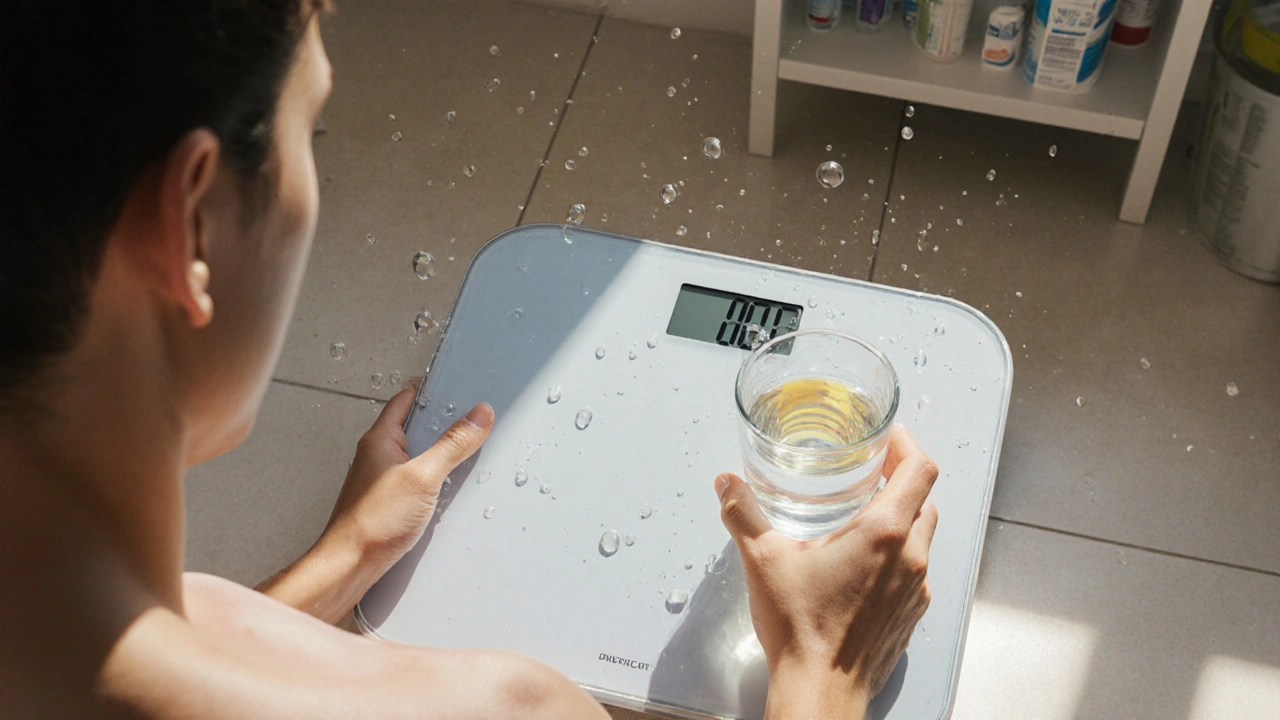Gastroenteritis and Weight Loss: What to Expect & How to Recover
 Oct, 5 2025
Oct, 5 2025
Gastroenteritis Weight Loss Estimator
When gastroenteritis is an inflammation of the stomach and intestines that usually triggers vomiting, diarrhoea, and stomach cramps, many people wonder why the scale takes a dip and how long the loss will last. Understanding the body’s response, the typical amount of weight that disappears, and the steps to regain it can turn a stressful few days into a manageable recovery.
Key Takeaways
- Weight loss during gastroenteritis is mostly water weight from dehydration and reduced food intake.
- Most adults lose 1‑3kg (2‑7lb) and rebound within a week once fluids and nutrition are restored.
- Severe dehydration, electrolyte imbalance, and prolonged illness can cause a larger, more lasting loss.
- Early rehydration, gentle nutrition, and monitoring symptoms are the safest ways to recover.
- Seek medical help if you lose more than 5% of body weight in 24hours or develop warning signs.
Why Weight Drops - The Physiology Behind the Numbers
The body’s reaction to gastroenteritis can be boiled down to three core processes:
- Fluid loss: Vomiting and watery stools can expel 1‑2liters of fluid per day. That fluid loss directly translates into weight loss because water makes up about 60% of body weight.
- Reduced calorie intake: Nausea often curtails appetite, meaning you’re eating far fewer calories than usual.
- Metabolic shift: Fighting off infection raises the basal metabolic rate slightly, burning a few extra calories.
When you combine those three, a 70‑kg adult might shed roughly 1‑3kg in a single episode. The loss is almost entirely reversible as soon as hydration and food return.
How Much Weight Is Normal?
Medical literature from 2023‑2024 shows a typical range of 0.5‑4% of total body weight lost during an acute gastroenteritis bout. For a 60‑kg person, that’s about 300g to 2.4kg. The key is the duration:
- Short‑term (<48hours): Expect 0.5‑1% loss, mostly water.
- Medium‑term (48‑96hours): 1‑2% loss, water plus a small caloric deficit.
- Prolonged (>96hours): Up to 3‑4% loss, especially if vomiting persists.
If weight loss climbs beyond 5% in a day, it’s a red flag for severe dehydration or an underlying condition, and a clinician should be consulted.

Dehydration and Electrolyte Imbalance - The Hidden Risks
While the scale may bounce back quickly, dehydration can jeopardise organ function. Dehydration occurs when the body loses more fluid than it takes in, leading to reduced blood volume and impaired cellular processes can cause dizziness, rapid heart rate, and in extreme cases, kidney injury.
Lost fluids also take essential electrolytes-sodium, potassium, chloride-with them. Electrolyte imbalance refers to abnormal concentrations of minerals that regulate nerve function and muscle contraction often manifests as muscle cramps, confusion, or irregular heartbeat.
Rehydration solutions that contain the right proportion of salts (approximately 90mmol/L sodium and 20mmol/L potassium) are far more effective than plain water for restoring balance.
Viral vs. Bacterial Gastroenteritis - Does the Cause Matter for Weight Loss?
| Factor | Viral Gastroenteritis | Bacterial Gastroenteritis |
|---|---|---|
| Typical duration | 1‑3 days | 3‑7 days (may be longer) |
| Average weight loss | 0.5‑2% of body weight | 1‑4% of body weight |
| Fever prevalence | Common (up to 38°C) | Variable, often higher in invasive strains |
| Risk of severe dehydration | Moderate | Higher, especially with toxin‑producing bacteria |
| Need for antibiotics | Never | Sometimes, depending on pathogen |
Both forms trigger similar fluid loss, but bacterial infections often linger longer and can produce toxins that exacerbate vomiting. That means a slightly larger, more persistent weight dip, which is why doctors may monitor bacterial cases more closely.
Steps to Rehydrate and Re‑nutrify Safely
The goal is to replace fluids, electrolytes, and calories without upsetting a still‑sensitive gut. Follow these practical steps:
- Start with small sips of a rehydration solution a sterile liquid that supplies water plus balanced electrolytes, such as oral rehydration salts (ORS). Aim for 50‑100ml every 10minutes.
- Progress to clear broths (chicken or vegetable) once vomiting eases. Broths provide sodium and a gentle protein source.
- Introduce the BRAT diet (bananas, rice, applesauce, toast) after 24hours of stable fluid intake. These foods are low‑fiber, low‑fat, and easy on the stomach.
- Gradually add fermented dairy (plain yogurt) for probiotics, which can help restore gut flora after a viral infection.
- When appetite improves, return to balanced meals with lean protein, cooked vegetables, and whole grains. Aim for 1‑1.5g of protein per kilogram of body weight per day to support tissue repair.
Monitor urine colour - pale yellow indicates adequate hydration, while dark amber suggests you need more fluids.

When to Seek Medical Attention
Most healthy adults bounce back without a doctor’s visit, but keep an eye out for these warning signs:
- Loss of more than 5% body weight in 24hours.
- Persistent vomiting that prevents any fluid intake for >12hours.
- Signs of severe dehydration: rapid pulse, low blood pressure, dizziness, or confusion.
- Blood in vomit or stool, indicating possible invasive infection.
- Fever above 39°C lasting more than 48hours.
In those cases, a clinician may order blood tests to check electrolyte levels, prescribe anti‑emetics, or, for bacterial infections, start an appropriate antibiotic.
Regaining Lost Weight - A Realistic Timeline
For most people, the lost weight returns within 3‑7days once normal eating resumes. The first few days will see a rapid rebound as the body re‑absorbs water. Fat loss becomes a factor only if the illness lasts beyond a week and appetite stays suppressed.
To support a smooth rebound:
- Stay hydrated throughout the recovery week.
- Consume nutrient‑dense snacks (nuts, cheese, smoothies) rather than high‑sugar treats.
- Gentle activity-like short walks-can stimulate appetite without over‑exerting the gut.
If weight hasn’t returned after two weeks, consider an evaluation for lingering malabsorption or another underlying condition.
Quick Checklist for Managing Gastroenteritis‑Related Weight Loss
- Begin ORS rehydration within the first hour of symptoms.
- Track fluid intake; aim for at least 2L per day for adults.
- Switch to bland, low‑fiber foods after 24hours of stable fluids.
- Watch for red‑flag symptoms and contact a healthcare professional promptly.
- Plan a gradual return to regular meals over 3‑5 days.
Frequently Asked Questions
Can gastroenteritis cause long‑term weight loss?
In most healthy adults the weight loss is temporary and linked to fluid loss. Long‑term weight loss only occurs if the infection is prolonged, if the person cannot eat for weeks, or if an underlying gastrointestinal disorder develops.
Is it safe to drink sports drinks instead of ORS?
Sports drinks contain sugar and electrolytes, but the sodium concentration is often lower than optimal for severe dehydration. ORS is formulated to match the body’s needs, so it’s the safest first choice. A sports drink can be used later for flavor once basic rehydration is achieved.
How soon can I resume dairy foods?
If you tolerate clear broths, introduce plain yogurt after 24-48hours. Yogurt’s probiotics can help restore gut flora. Avoid high‑fat cheeses until you’re fully back to solid meals.
Should I take over‑the‑counter anti‑diarrheal medication?
For viral gastroenteritis, doctors often advise against it because slowing the gut can keep the virus longer. In bacterial cases with severe cramps, a short‑term dose may be recommended, but only under medical guidance.
When is hospitalization necessary?
Hospital care is needed if you cannot keep any fluids down, if you show signs of severe dehydration (e.g., low blood pressure, rapid pulse), or if you develop high fever, bloody stools, or persistent vomiting lasting more than 24hours.

justin davis
October 5, 2025 AT 16:30So you think a few hours of tummy trouble will melt the pounds off? Yeah, right!!! Stay hydrated, rest, and stop expecting a magic skinny‑dip!!!
David Lance Saxon Jr.
October 11, 2025 AT 08:56When confronting gastro‑enteric catabolism, one must first acknowledge the thermodynamic flux inherent to diarrheal states. The fluidic exodus precipitates a measurable decrement in mass, yet this is principally a redistribution of water rather than true adipose reduction. Clinical literature delineates that acute volume loss can approximate 2‑5 % of body weight within 48 hours, contingent upon severity. However, the metabolic downstream effects are modest; catabolic hormones surge, prompting transient glycogenolysis. Consequently, hepatic glycogen stores are depleted, accounting for the initial weight dip. This phenomenon is frequently misconstrued as fat loss, a misinterpretation that persists in lay discourses. In actuality, once rehydration commences, the scale rebounds, often surpassing pre‑illness values due to inflammatory edema. Moreover, bacterial etiologies may incite prolonged malabsorption, extending the catabolic window. Viral agents, while self‑limiting, still impose an osmotic imbalance that can exacerbate electrolyte disturbances. Practitioners recommend a phased re‑feeding protocol: commence with isotonic solutions, then introduce low‑residue, bland solids. Probiotic supplementation has demonstrated efficacy in restoring gut flora equilibrium, attenuating symptom duration. Concurrently, monitoring serum electrolytes guards against hypokalemia and hyponatremia, complications that can impede recovery. Patients should eschew high‑fat, high‑sugar foods until gastrointestinal integrity is re‑established. Gradual escalation to a balanced macronutrient regimen facilitates normalization of basal metabolic rate. Ultimately, the weight trajectory post‑gastroenteritis reflects fluid balance restoration rather than substantive adipose catabolism. Awareness of this nuance empowers individuals to set realistic expectations and avoid precipitous dieting during convalescence.
Moore Lauren
October 17, 2025 AT 01:21Drink clear fluids, rest, and eat bland foods like toast or rice to ease your stomach back to normal
Jonathan Seanston
October 22, 2025 AT 17:46Hey there, just wanted to say you’re doing fine – the key is to stay hydrated and take it easy until your gut settles back down
Sukanya Borborah
October 28, 2025 AT 09:12Okay, first off, the whole “estimate weight loss” widget looks like a cheap flash‑sale gimmick – the UI is clunky and the validation messages are a grammatical nightmare, “Please enter a valid weight between 30 and 200 kg.” – with a period inside the quotes, which is just wrong. Also, the calculator ignores the fact that viral gastroenteritis rarely causes more than 2–3 % fluid loss, so the numbers it spits out are basically meaningless unless you factor in electrolyte balance. Bottom line: it’s a half‑baked tool that could mislead the casual reader.
bruce hain
November 3, 2025 AT 01:37While the premise is commendable, the model oversimplifies pathophysiology, rendering the prognostication arguably reductive.
Stu Davies
November 8, 2025 AT 18:02I totally get how unsettling this can feel 😊. Keep sipping electrolyte drinks and give your body the time it needs to heal 🙏.
Nadia Stallaert
November 14, 2025 AT 10:28Beware, dear reader, for the silent thief of gastroenteritis does not merely steal your comfort but conspires to rob you of your very mass! The cramping, the relentless vomiting, the watery onslaught – each wave is a clandestine operation against your torso! And as the fluids flee, your scale whispers lies of rapid loss, promising a miracle diet without effort! Yet, what you see is but the illusion of dehydration, a fleeting mirage that will vanish once the storm passes! Do not be seduced by the false promise of “instant weight loss” – it is a trap set by the very virus that seeks to dominate your body! Rehydrate with purpose, restore electrolytes, and let your gut rebuild its fortress before you contemplate any caloric restriction! Remember, the body’s resilience is profound, but only if you honor its need for rest and nourishment! 🌪️💀
Greg RipKid
November 20, 2025 AT 02:53Hydration is key.
John Price Hannah
November 25, 2025 AT 19:18Oh, the theatrical tragedy of an upset stomach! One moment you’re a picture‑perfect health enthusiast, the next you’re flailing in a bathroom like a Shakespearean fool! But fear not, brave soul – each bout of diarrhea is merely a curtain call for your internal actors to exit stage left, making room for the encore of recovery! Grab that ginger tea, summon the broth, and let the curtain rise on a healthier you!!!
Echo Rosales
December 1, 2025 AT 11:44While I appreciate the scrutiny, the tool’s simplicity actually aids laypersons who lack medical training – over‑engineering can alienate the very audience it aims to help.
Elle McNair
December 7, 2025 AT 04:09Let’s agree the advice to stay hydrated and rest is solid for most cases.
Dennis Owiti
December 12, 2025 AT 20:34Im sory youre feeling bad. Keep drinkin water and take it slow.
Justin Durden
December 18, 2025 AT 13:00U got this! Start with small sips, then easly add soft foods. You'll be back on your feet in no time.
Sally Murray
December 24, 2025 AT 05:25From a phenomenological perspective, gastroenteritis serves as a perturbation to homeostatic equilibrium, prompting a transient shift in corporeal mass that is fundamentally restorative rather than reductive.
Bridgett Hart
December 29, 2025 AT 21:51The clinical sequelae of acute enteric infection predominantly involve fluid loss; consequently, any observed weight reduction is largely attributable to dehydration rather than adipose tissue catabolism
Sean Lee
January 4, 2026 AT 14:16In the lexicon of metabolic pathways, the acute catabolic response to enteric pathogens triggers glycogenolysis and proteolysis, mechanisms that transiently modulate body composition without substantive adipose depletion.
Michael Christian
January 10, 2026 AT 06:41Stop freaking out – just drink fluids, eat bland food and you’ll be fine.
Steven Elliott
January 15, 2026 AT 23:07Sure, because drinking a gallon of sports drink will magically turn you into a runway model overnight.
Lawrence D. Law
January 21, 2026 AT 15:30It is imperative, as patriots of health, to adhere to scientifically validated rehydration protocols; any deviation reflects a regrettable neglect of national wellness standards!!!